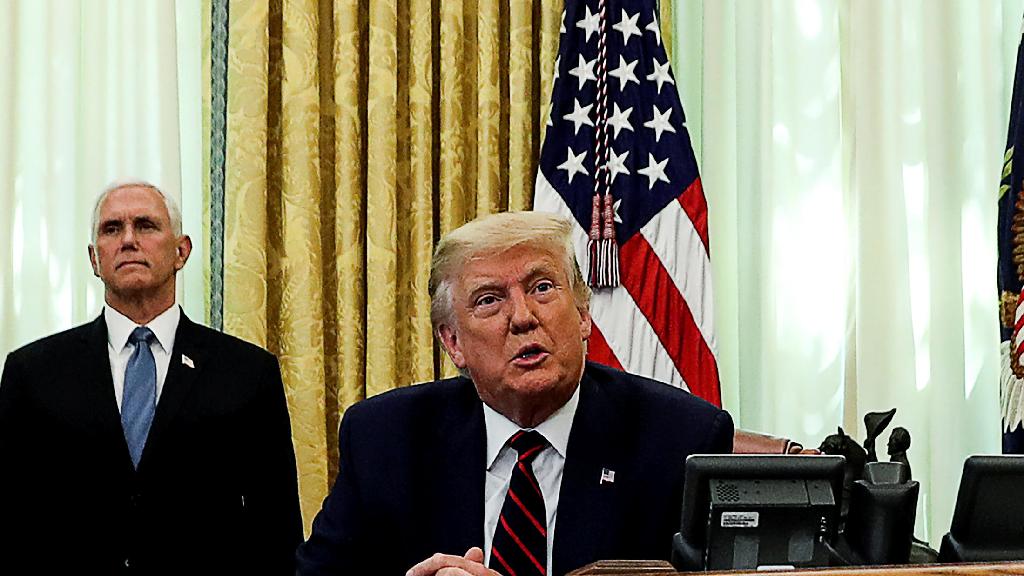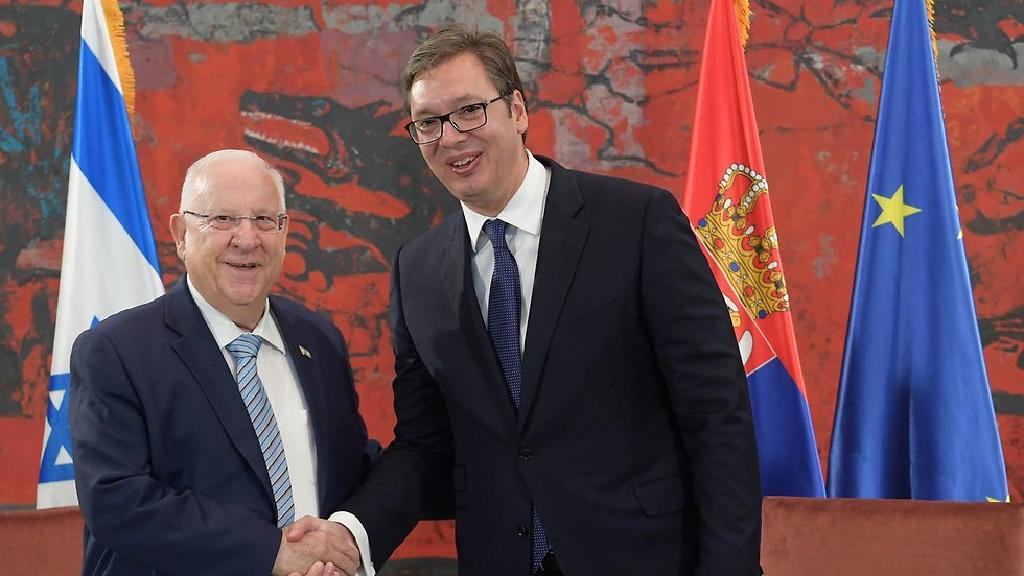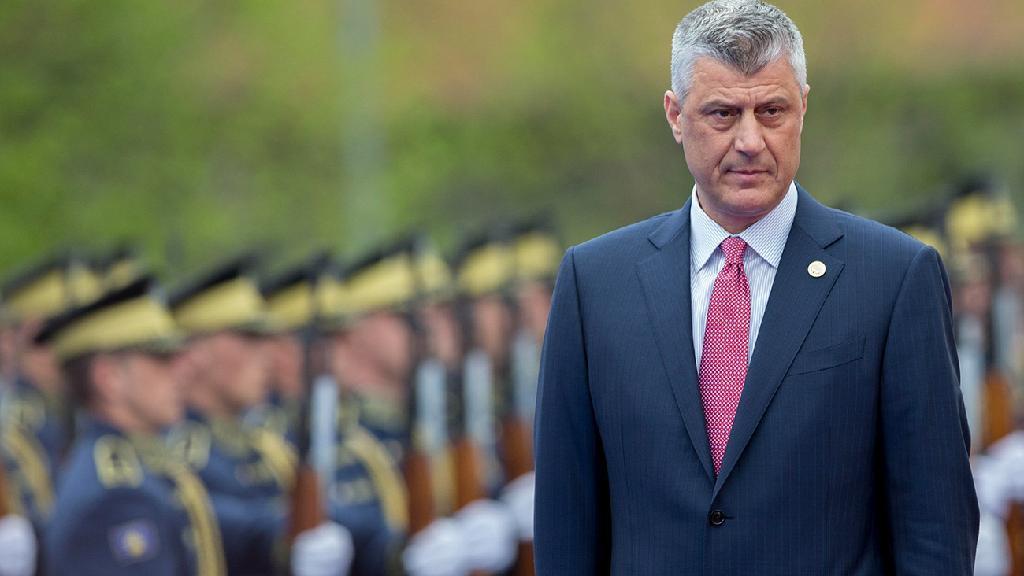In a curious turn of events, US President Donald Trump’s announcement on Friday that he had brokered a deal to normalize economic ties between Serbia and Kosovo threw Israel into the Balkan mix, eliciting concern from former Israeli diplomats familiar with the region.
“We’re not connected to the Balkan conflict and we’re not supposed to be [in the pact],” Israel’s former ambassador to Serbia, Arthur Koll, said. “The question that should be raised is why Israel was thrown in there,” he said.
3 View gallery


U.S President Trump announces he had brokered deal between Servia and Kosovo
(Photo: Reuters)
As part of the agreement, both Serbia and Kosovo committed to establish embassies in Jerusalem and recognize the city as Israel’s capital. Israel, in return, agreed to recognize Kosovo, which unilaterally declared its independence from Serbia in 2008.
For years, Israel avoided making such a move so as not to provide a precedent that could potentially backfire in its battle against global recognition of unilateral Palestinian declarations of independence.
“I’m not sure it’s in Israel’s interest to get mixed up in this deal,” Koll stated. “We’re paying a price by surrendering a principal of ours, a long standing policy. It’s a step that might have future repercussions for the Israel-Palestinian conflict.”
The retired diplomat believes that the “Israeli clauses” were a result of “US pressure on Israel, pressure that can’t be disconnected” from the upcoming US presidential election.
“We’ve seen President Trump trying to show some victories in the international arena in recent weeks. This is one big mix, a package deal that was sewn to serve Trump’s campaign,” he said.
“After the past three election cycles in Israel, in which Trump diplomatically assisted [Prime Minister Binyamin] Netanyahu repeatedly [by recognizing Israel’s sovereignty over the Golan Heights and unveiling a Middle East peace plan], Netanyahu now just had to return the favor,” he explained.
The agreement signed in the Oval Office by Serbian President Aleksandar Vucic and Kosovar Prime Minister Avdullah Hoti revolved mainly around economic issues. Vucic also agreed to suspend for one year efforts against Kosovo’s sovereignty in return for financial perks from the US.
To another retired Israeli diplomat, the portion of the deal regarding Israel and Jerusalem seems flimsy and not very well thought out.
“Serbia is currently in negotiations to enter the European Union…. The EU’s stance on the Palestinian question is very clear – all of its countries oppose recognizing Jerusalem as the capital [of Israel] right now,” Oded Eran, Israel’s former ambassador to the European Union and today a senior research fellow at the Tel Aviv University-affiliated Institute for National Security Studies, said.
“What will the Europeans say to Serbia if it moves its embassy to Jerusalem? Will that move hurt its chances of being allowed into the EU? Does that mean Serbia won’t do it?” Eran said.
Koll is even more explicit. “We must remember – Serbia didn’t recognize Kosovo’s independence in this deal, so now it’s going to make such a gesture [to] Israel after Israel recognized Kosovo? I’m a bit [of a] skeptic,” he emphasized.
But there is more. “Vucic said that Israel’s decision to recognize Kosovo isn’t connected to the agreement [signed at the White House] and is Israel’s own decision, and also that Serbia’s transfer of its embassy to Jerusalem is conditioned on Israel’s respecting Serbia’s interests,” Koll said.
3 View gallery


President Rivlin with his Serbian counter part President Aleksandar Vučić on a visit to Belgrade in 2018
(Photo: GPO)
“This a big hint that they won’t transfer their embassy at all,” he stated.
On Saturday, Netanyahu lauded the idea of a Kosovo embassy in Jerusalem, saying this would make it the first Muslim country to recognize the holy city as Israel’s capital. Yet the former ambassadors are in agreement that this part of the deal, too, carries little weight, if it is indeed to happen.
“Kosovo does not have enough influence the Muslim world; it’s hardly considered a Muslim empire,” jokes Eran, who also served as ambassador to Jordan and as head of Israel’s negotiating team with the Palestinians.
“It will probably set off a 24-hour news cycle, but let’s see first if it… happens at all,” he said.
Koll agrees. “We must remember that Kosovo is still not a country recognized by the international community, so this move won’t lead to any dramatic change, if it indeed happens,” he said.
“I hope that everyone transfers their embassy to Jerusalem,” he continued. “But after the US did it [in 2018], there was talk of other countries following suit – the Czech Republic, Romania. That hasn’t happened. You need to muster a lot of optimism to believe this deal will lead to other Muslim countries doing anything similar.”
Article written by Uri Cohen
Reprinted with permission from The Media Line


